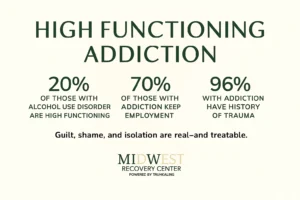If you stopped showing up to treatment, you’re probably carrying more than just silence right now.
Maybe you missed a session… then another… and then the shame started to build. Now it’s been days, weeks, maybe longer—and the thought of returning feels like climbing back into a room you walked out of with no goodbye.
If that’s where you are, you’re not the only one. And you’re not disqualified.
At Midwest Recovery Center, we understand what it means to ghost a group, pause a plan, or disappear for a while. We’ve seen people restart their Intensive Outpatient Program in Toledo, Ohio with nothing but a quiet, shaky, “Hey… is it too late?”
It never is.
This blog is for you—if you’re scared to come back, but you still want to.
First: You Don’t Have to Justify Why You Left
Maybe it was the holidays. Maybe a stressful week at work. Maybe you felt like you were doing okay… until suddenly, you weren’t.
Here’s what we won’t say:
- “Why didn’t you tell us?”
- “You should’ve stayed.”
- “You were doing so well.”
Here’s what we will say:
- “We’re glad you reached out.”
- “Let’s figure out where you are now.”
- “You’re still welcome here.”
Because whether you stepped away from treatment because of relapse, depression, embarrassment, life overload—or no clear reason at all—you’re human. And humans take detours. That doesn’t make you unworthy of return.
Guilt, Shame, and Isolation Are Real—and Treatable
When you drop out of treatment, it’s easy to spiral into self-blame.
Maybe you tell yourself:
- “They think I gave up.”
- “I wasted their time.”
- “I’ll never be able to show my face again.”
But guilt and shame are symptoms, not character flaws.
They show up when pain hasn’t been processed—when your nervous system is trying to protect you from more hurt.
And isolation? That’s the echo of silence after too many days alone with your thoughts.
These feelings aren’t signs you’ve failed. They’re signals that you need connection again.
Coming back to treatment doesn’t erase those emotions overnight—but it puts them in a room where they can breathe.
The First Step Back is Often the Smallest—and Most Brave
If you’ve been away from IOP, you don’t need a speech. You don’t need to explain everything. You don’t even need to have a plan.
You just need to reach out.
A short call. A one-sentence text. An email that says, “Hey… I think I want to come back.”
You might be surprised how soft the landing is.
At Midwest Recovery Center, we don’t ask for perfection. We don’t tally how long you’ve been gone. We don’t read you the policy manual.
We just start from where you are. Right now.
What Happens When You Re-Engage in IOP
You may be wondering—do I have to start all over? Will the group remember me? Will it be weird?
Here’s what typically happens:
- You reconnect with a care coordinator who checks in about where you’re at emotionally and logistically.
- We review your original treatment plan—together. If life looks different now, we adapt.
- You step back into group or individual sessions at a pace that fits your current needs.
- You’re welcomed back, not questioned.
Some clients restart in the same Intensive Outpatient Program in Toledo. Others adjust to a new level of care based on where they are mentally and emotionally.
No punishment. No shame. No starting at square one unless you want to.
You Won’t Be the First—or the Last—to Ghost and Return
Dropping out of treatment isn’t rare. It’s part of how many people navigate healing.
Sometimes it takes two or three tries to finish a program. Sometimes more.
If you think you’re the only one who left and came back, let us reassure you: you’re not.
And if you’re looking for an Intensive Outpatient Program in Perrysburg, Ohio or Youngstown, Ohio, our regional programs are just as welcoming to restarters as to first-timers.
The doors didn’t close behind you.
They’re still open—quietly, patiently—waiting for when you’re ready.

Why Coming Back Now (Not Later) Matters
There’s always a temptation to wait for the “right time”:
- After the holidays
- After the semester ends
- After this one last tough week at work
But healing doesn’t ask for perfect conditions.
It just needs your presence. And the truth is, the longer you wait, the harder the return feels—not because it is harder, but because shame keeps growing in silence.
This season, give yourself the chance to come home to yourself.
Even if it’s been a while. Even if you’re scared.
Especially if you’re scared.
FAQs
Do I have to explain why I left the program?
No. You’re welcome to share whatever you’re comfortable with, but there’s no requirement to justify your absence. We’re here to move forward, not rehash the past unless it helps you heal.
Will I need to restart the entire IOP process?
Not unless you want to. We’ll review your progress together and either resume where you left off or adjust based on your current needs.
Is it common for people to return after ghosting treatment?
Very common. Many people take a break from treatment and come back. We expect it. We’ve built support systems that honor that process.
What if I relapsed while I was away?
That’s part of many people’s journey. You’re not disqualified. In fact, your willingness to come back shows strength and honesty. We can help you process it and move forward.
Will the group or staff judge me?
Not at all. You’ll likely find more support than you expect—from staff and peers alike. The act of returning is respected, not ridiculed.
I’m nervous to face people I ghosted. What do I say?
You can say as little or as much as you like. Most people in treatment know that ghosting happens. Chances are, someone else in the group has done the same and will be glad you made it back.
You Can Still Come Back—and Be Met With Grace
There’s no expiration date on your healing.
No invisible line that, once crossed, locks you out of care.
At Midwest Recovery Center, we believe every return is a win.
Whether it’s been three weeks, three months, or three years—you can still walk back through the door and say, “I’m ready.”
We’ll walk with you the rest of the way.
Call (888) 657-0858 or visit Intensive Outpatient Program in Toledo, Ohio to reconnect with a team that sees you—not just where you left off, but where you still want to go.


























